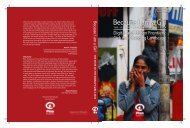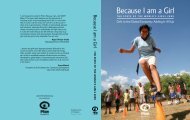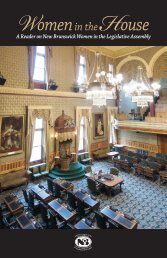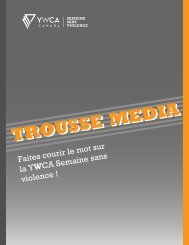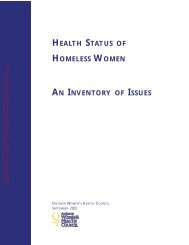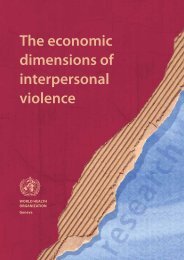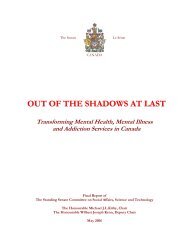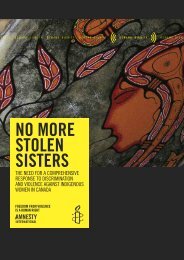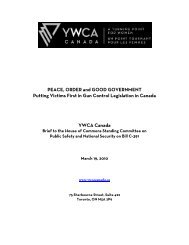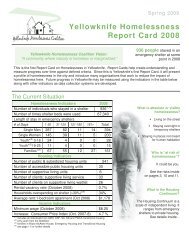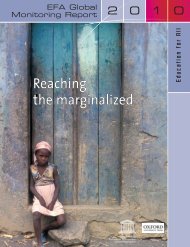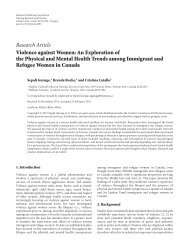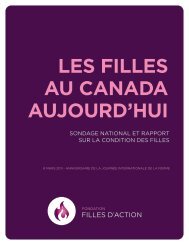Gender Report Card on the International Criminal ... - YWCA Canada
Gender Report Card on the International Criminal ... - YWCA Canada
Gender Report Card on the International Criminal ... - YWCA Canada
Create successful ePaper yourself
Turn your PDF publications into a flip-book with our unique Google optimized e-Paper software.
OTP Situati<strong>on</strong>s and Cases<br />
proven by <strong>the</strong> Prosecuti<strong>on</strong> at trial bey<strong>on</strong>d a reas<strong>on</strong>able<br />
doubt. However, <strong>the</strong> Defence indicated that, if <strong>the</strong> Trial<br />
Chamber determines that <strong>the</strong>se three issues have been<br />
proven, ‘<strong>the</strong> Accused pers<strong>on</strong>s will plead guilty to <strong>the</strong><br />
charges preferred against <strong>the</strong>m without prejudice to<br />
<strong>the</strong>ir right to appeal <strong>the</strong> Chamber’s decisi<strong>on</strong>’. 755<br />
Both parties also agreed not to submit any additi<strong>on</strong>al<br />
evidence or make any additi<strong>on</strong>al submissi<strong>on</strong>s<br />
regarding <strong>the</strong> guilt or innocence of <strong>the</strong> accused unless<br />
<strong>the</strong> Chamber deemed it necessary. The parties claimed<br />
that this approach would ‘significantly shorten <strong>the</strong><br />
trial proceedings by focusing <strong>the</strong> trial <strong>on</strong>ly <strong>on</strong> those<br />
issues that are c<strong>on</strong>tested between <strong>the</strong> Parties’, and<br />
would promote ‘an efficient and cost-effective trial’<br />
while still preserving <strong>the</strong> right of victims to participate<br />
and <strong>the</strong> right of <strong>the</strong> accused to a fair and expeditious<br />
trial. 756 This is <strong>the</strong> first time at <strong>the</strong> ICC that a Defence<br />
team has indicated its willingness to enter a guilty plea<br />
if certain facts are proven. On 28 September 2011, Trial<br />
Chamber IV issued a decisi<strong>on</strong> <strong>on</strong> <strong>the</strong> joint submissi<strong>on</strong><br />
<strong>on</strong> agreed facts in <strong>the</strong> case. 757 The Legal Representative<br />
of Victims had objected to <strong>the</strong> Prosecuti<strong>on</strong> and<br />
Defence submissi<strong>on</strong> <strong>on</strong> <strong>the</strong> grounds that <strong>the</strong> proposed<br />
restricti<strong>on</strong> of <strong>the</strong> facts and evidence would cause<br />
serious prejudice to victims’ participati<strong>on</strong> rights by<br />
limiting <strong>the</strong> factual issues examined at trial and<br />
<strong>the</strong>reby infringing <strong>on</strong> <strong>the</strong> victims’ right to know <strong>the</strong> full<br />
facts of what occurred at <strong>the</strong> MGS Haskanita and <strong>the</strong><br />
full extent of <strong>the</strong> resp<strong>on</strong>sibility of <strong>the</strong> two accused. 758<br />
However, <strong>the</strong> Chamber held that <strong>the</strong> procedures<br />
proposed in <strong>the</strong> joint submissi<strong>on</strong> would ‘facilitate <strong>the</strong><br />
fair and expeditious c<strong>on</strong>duct of <strong>the</strong> proceedings’ and<br />
that ‘a more complete presentati<strong>on</strong> of <strong>the</strong> alleged<br />
facts in <strong>the</strong> case [was] not required in <strong>the</strong> interests<br />
of justice’. 759 Therefore, without limiting its powers<br />
to request additi<strong>on</strong>al evidence, <strong>the</strong> Chamber agreed<br />
that <strong>the</strong> trial would proceed <strong>on</strong>ly <strong>on</strong> <strong>the</strong> basis of <strong>the</strong><br />
c<strong>on</strong>tentious issues outlined in <strong>the</strong> joint submissi<strong>on</strong>,<br />
and that <strong>the</strong> parties would not present evidence or<br />
make submissi<strong>on</strong>s <strong>on</strong> any o<strong>the</strong>r issues. 760<br />
Translati<strong>on</strong> issues<br />
On 16 March 2011, Trial Chamber IV 761 was c<strong>on</strong>stituted<br />
to hear <strong>the</strong> case against Banda & Jerbo. 762 This is<br />
<strong>the</strong> sec<strong>on</strong>d Trial Chamber composed exclusively of<br />
female judges, al<strong>on</strong>g with Trial Chamber III, 763 which is<br />
presiding over <strong>the</strong> Bemba trial. At <strong>the</strong> time of writing<br />
this <str<strong>on</strong>g>Report</str<strong>on</strong>g>, a date for <strong>the</strong> start of trial has not been set<br />
due to translati<strong>on</strong> problems. Pursuant to Article 67(f)<br />
of <strong>the</strong> Rome Statute, <strong>the</strong> accused has a right ‘to have<br />
<strong>the</strong> assistance of a competent interpreter and such<br />
translati<strong>on</strong>s as are necessary to meet <strong>the</strong> requirements<br />
of fairness, if any of <strong>the</strong> proceedings or documents<br />
presented to <strong>the</strong> Court are not in a language which<br />
<strong>the</strong> accused fully understands and speaks’. Both Banda<br />
and Jerbo speak Zaghawa, a local Sudanese (n<strong>on</strong>written)<br />
language. However, <strong>the</strong> ICC currently does not<br />
have interpreters competent to translate documents<br />
and proceedings from Zaghawa into ei<strong>the</strong>r French<br />
or English, <strong>the</strong> two working languages of <strong>the</strong> Court.<br />
Given <strong>the</strong> need to set a date for <strong>the</strong> commencement<br />
of trial within a reas<strong>on</strong>able time, <strong>on</strong> 1 July 2011 <strong>the</strong><br />
Chamber ordered that preparati<strong>on</strong>s for provisi<strong>on</strong><br />
of interpretati<strong>on</strong> for <strong>the</strong> accused ‘be undertaken<br />
immediately’, and instructed <strong>the</strong> Registry to begin<br />
any necessary training of Zaghawa interpreters. 764<br />
The Chamber deferred its decisi<strong>on</strong> <strong>on</strong> whe<strong>the</strong>r <strong>the</strong><br />
interpretati<strong>on</strong> used at trial should be simultaneous<br />
or c<strong>on</strong>secutive, but said it would rule <strong>on</strong> it in due<br />
course. At <strong>the</strong> time of writing, no decisi<strong>on</strong> has yet been<br />
issued <strong>on</strong> <strong>the</strong> matter. Language issues also arose in<br />
<strong>the</strong> Mbarushimana case, discussed above, and in <strong>the</strong><br />
Katanga & Ngudjolo case, discussed fur<strong>the</strong>r in Trial<br />
Proceedings.<br />
755 ICC-02/05-03/09-148, para 5.<br />
756 ICC-02/05-03/09-148, para 8.<br />
757 ICC-02/05-03/09-227.<br />
758 ICC-02/05-03/09-190-tENG.<br />
759 ICC-02/05-03/09-227, paras 44-45.<br />
760 ICC-02/05-03/09-227, para 46.<br />
761 Trial Chamber IV is composed of Presiding Judge Joyce<br />
Aluoch (Kenya), Judge Fatoumata Dembele Diarra (Mali)<br />
and Judge Silvia Fernández de Gurmendi (Argentina).<br />
762 ICC-02/05-03/09-124 and ICC-02/05-03/09-126.<br />
763 Trial Chamber III is composed of Presiding Judge Sylvia<br />
Steiner (Brazil), Judge Joyce Aluoch (Kenya) and Judge<br />
Kuniko Ozaki (Japan).<br />
764 ICC-02/05-03/09-172.<br />
166





